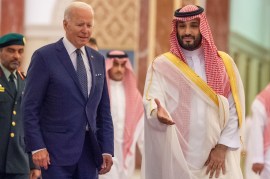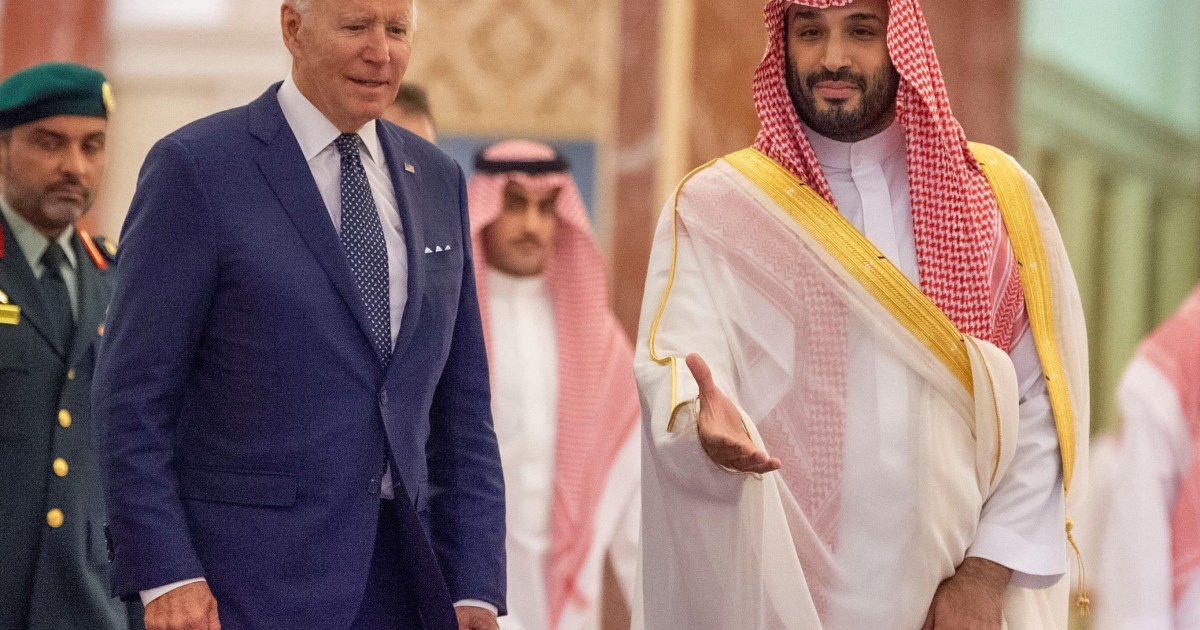
President Joe Biden’s much-touted trip to the Middle East — his first as president — was almost entirely devoid of drama or excitement. It produced no significant deliverables, nor was it meant to. To be underwhelmed, however, is to miss a more troubling story. The visit may have been pointless and performative, but it was also a major setback for American interests, confirming what many long suspected: Supposed allies can disrespect, embarrass, and undermine the United States at will.
The costs are already evident. On July 16, less than 24 hours after Biden left the region, the United Arab Emirates sentenced an American citizen, Asim Ghafoor, to three years in prison on nebulous charges. Ghafoor, a lawyer for the slain Washington Post columnist Jamal Khashoggi, was detained only two days prior while transiting through Dubai International Airport.
This is the sort of thing that happens under dictatorships. But it is not the sort of thing that happens under dictatorships that are ostensibly close U.S. partners. In effect, the leaders of the UAE either are taunting Biden or are indifferent to the perception that they are taunting him. Neither of these possibilities is encouraging. Such provocations illustrate a long and enduring story in the Middle East, one in which the United States again and again proves unable to respond with any sense of purpose or self-respect. Autocrats test the limits to see how far they can go, only to find that such a limit doesn’t exist.
Saudi Arabia offers an even starker example. Years ago, when Middle East hands would joke that the kingdom could get away with murder, it was merely a figure of speech. But then the Saudis really did get away with it. Perhaps the sole memorable moment from Biden’s trip was his fist bump with the Saudi crown prince and de facto leader, Mohammed bin Salman (a.k.a. MBS). MBS needed only four years to rehabilitate himself after the grisly murder of Khashoggi, in which he was directly implicated.
But the meeting wasn’t merely a rehabilitation. In the misplaced hope of easing gasoline costs at home, the American president felt he needed to go to MBS to ask him to boost oil production. This wasn’t quite groveling — the proud and stubborn Biden was unlikely to reduce himself to that — but it was a clear demonstration of an administration ever weaker and more adrift.
One cannot overstate just what an odd and unwarranted reversal of the balance of power this was. The United States is a superpower — and, for now at least, the superpower. Saudi Arabia and the UAE are, to use an impolitic term, client states. In other words, they depend on American power for their security and survival. Their armies would be grounded in short order if the United States were to suspend all military provisions, including spare parts and maintenance for equipment as well as training and logistical support. At the risk of stating the blindingly obvious, they need us more than we need them. Yet if an extraterrestrial descended from outer space and witnessed last week’s events without the benefit of prior knowledge, they might have assumed the opposite — that the United States was the junior partner paying tribute to its superpower patrons.
The president’s very public deference to a brutal but weak regime is not just a problem for American strategy; it is a problem for American identity. On the world stage, is this what we’re intent on becoming?
Of course, former President Donald Trump was enamored of the Saudis and acted accordingly. Today, the same coddling of autocrats is happening under a Democratic administration, despite Biden’s insistence that his predecessor’s approach would be a thing of the past. In a sense, Biden has left us with the worst of both worlds, an untenable middle position that rarely works in the Middle East. The United States still has a pro-autocrat policy, only the autocrats in question don’t like us and don’t even pretend to respect us. Upon arriving in Saudi Arabia, Biden received a cold welcome from his hosts. Barack Obama found himself similarly snubbed during a 2016 visit. Obama was responsible for a historic increase in arms sales to Saudi Arabia, but his goodwill was neither appreciated nor reciprocated. This is not an accident. In fact, what analysts have called “reverse leverage” is perhaps the defining feature of America’s relationship with Arab autocrats. The United States rarely puts conditions on military support to the Gulf. Gulf states, in turn, take the assistance for granted, viewing it as an entitlement.
The result is intensifying repression, including the harassment and detention of U.S. citizens. But American officials may not be sufficiently moved by moral objections. After all, the United States is a country, not a human rights organization. In this imperfect, tragic world, America has to deal with dictators. Such an argument might hold up if Saudi Arabia and the UAE were reliable American allies. They are not. Emboldened and unaccountable, they are behaving recklessly, including in the realm of foreign policy. The ever-expanding list of examples includes attempting to cozy up to China, plotting a more conciliatory approach toward Russia, kidnapping the Lebanese prime minister, fueling the long-running war in Yemen, and supporting the side opposite the U.S. in Libya’s proxy battles.
The hardheaded pragmatist may insist that such adventurism must be stomached, a necessary evil on the path to “stability.” But what is happening now is not that. It is worse. America is being manipulated by the very countries that depend on it for their security. Somehow, the United States has managed the unlikely feat of undermining both its values and its interests. As it turns out, in the Middle East, the two cannot be separated.


